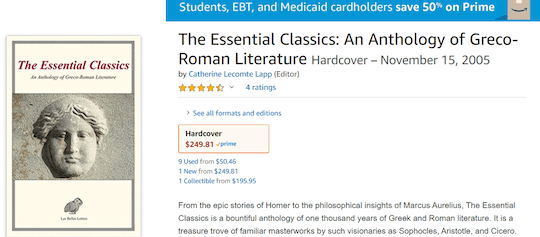Food of the Gods
Posted April 12, 2021
Chris Campbell
Lowry is yet another outspoken pundit among many who’ve come to see the rise of Ivy-League “wokeness” as doing more societal harm than good.
Especially, he says, in the ongoing attempts at eradicating the classics from the university curriculum.
“At a time when Abraham Lincoln doesn’t pass muster in the progressive precincts of America,” he writes, “poor benighted Homer, whose chief subject was toxic masculinity, probably doesn’t stand a chance.”
The irony of banishing the classics from Western universities, says Lowry, is lost entirely on those within today’s hallowed-turned-hollowed halls.
Lowry:
“A key difference between the Greeks and Romans and the rest was that their writers critiqued and lampooned their own societies. This willingness to engage in self-criticism became one of the hallmarks, and strengths, of Western culture.”
And now Lowry fears the West’s propensity for self-criticism could be its downfall.
Personally, I’m not as pessimistic.
Last week, we saw the many unintended consequences of censorship. In short, “cancel culture” tends to have the exact opposite effect.
Case in point: Although the classics are dying in universities, they’ve never been more popular in mainstream society.
The Ancient Brain
As we also saw last week, we have much to learn from the ancients.
The modern mind is, according to Ian McGilchrist, dominated by an entirely different way of thinking than the ancient mind -- left-hemisphere thinking.
McGilchrist is the world’s leading expert on brain hemispheres. His book makes the compelling case that the West has gone lopsided because, fundamentally, the manner in which we view the world (and teach about it) is lopsided.
The left hemisphere sees the world as linear, reductive, mechanistic, compartmentalized, and deterministic… and it treats it, and everyone in it, as such.
(You don’t have to scratch very deep to see that nearly all of our institutions -- from finance to medicine to academia to government -- lean heavily into this mechanistic lens. And, as a result, usually only end up “solving” big problems with even bigger ones.)
On the other hand…
The right hemisphere, McGilchrist argues, sees the world as dynamic, complex, interrelated, and unpredictable… and it also treats it, and everyone in it, as such as well.
The ancient world, he explains, was much more weighted toward the right hemisphere, which, of course, presented its own limitations.
In the same way we often blame “genetic determinism” for most major illnesses, the ancient Greeks might’ve blamed the gods for storms, sickness, crop failures, or even for getting too drunk and making a fool of oneself in the town square. (Dionysus strikes again!)
[Zeus lamented as much in Homer’s Odyssey, when he said: “Oh demons, how mortals blame the gods! They say that evils come from us, but they, because of their faults, get sorrows beyond fate!”]
Even so, as said, we still have a lot to learn from the ancients.
One area of interest is their more “holistic,” or all-encompassing ideas on health and healing, with which we are only beginning to catch up.
Food of the Gods
In contrast to the widespread belief that the mind and body are split (thanks to Descartes), which was unthinkable to the ancients...
We now know that the gut, not the brain, produces the vast majority (up to 90%) of the body's serotonin.
We also now know, contrary to popular thought, that our environment plays just as much a role in our health, and our genes, than does our genetic history.
(The eugenicists are wrong: genes aren’t destiny.)
We’re also beginning to recognize what the ancient stoics and cynics understood centuries back:
Diet is paramount.
But not just what we eat. How we eat. And even being mindful of why we eat.
Today, for a special “Ancient Wisdom” episode of LFT...
We invite our friends at Classical Wisdom back to the show.
Below, Donald Robertson reveals the ancient diets of the cynics and the stoics…
The stoic’s philosophy behind food…
And even a recipe for “stoic soup.”
Before you pull out the pots and pans, however…
Remember the essential insight of the classics: though there might be progress in the material world, human nature remains essentially the same.
Ideas come and go… and then resurface repackaged. New is the well-forgotten old.
This applies to both bad and good ideas alike.
The classics help us maintain the big-picture perspective in chaotic and uncertain times, and perhaps see things we have, with our modern minds, overlooked.
In short, they help us to regain a perspective on the world, and ourselves, that’s been “lost” through the ages.
As it happens, there’s one special book, compiled by Bill and Will Bonner, designed to help you do just that.
And though this book retails for over $200 on Amazon…

Our friends at Classical Wisdom want to get it in your hands for far less.
Help us keep the classics alive…
Click here to claim your copy.
And read on.
How to Eat Like a Stoic: The Ancient Diets of Cynicism and Stoicism
by Donald Robertson
The ancient Cynic and Stoic philosophers were very interested in food. (At the end of this article you’ll even find a modern recipe for Stoic soup.)
They talk both about what we should eat and how we should eat it, if we want to live wisely and gain strength of character. For instance, we’re told of the Stoic teacher Musonius Rufus:
He often talked in a very forceful manner about food, on the grounds that food was not an insignificant topic and that what one eats has significant consequences. In particular, he thought that mastering one’s appetites for food and drink was the beginning of and basis for self-control.
Musonius taught that Stoics should prefer inexpensive foods that are easy to obtain and most nourishing and healthy for a human being to eat. It might seem like common sense to “eat healthy” but the Stoics also thought we potentially waste far too much time shopping for and preparing fancy meals when simple nutritious meals can often be easily prepared from a few readily-available ingredients.
Musonius advises eating plants and grains rather than slaughtered animals. He recommends fruits and vegetables that do not require much cooking, as well as cheese, milk, and honeycombs.
The Stoic weren’t strictly vegetarian — unlike their philosophical cousins the Pythagoreans. Some Stoics were probably vegetarian and others not, although they wouldn’t have eaten very much meat in general.

The Early Stoic and Cynic Diet
Zeno of Citium, the founder of the Stoic school, had for many years been a Cynic philosopher. “Zeno”, we’re told, “thought it best to avoid gourmet food, and he was adamant about this.” He believed that once we get used to eating fancy meals we spoil our appetites and start to crave things that are expensive or difficult to obtain, losing the ability to properly enjoy simple, natural food and drink.
We know more about the Cynic diet because it was simpler and more austere. The Cynics were known, typically, for drinking water (instead of wine), and eating barley-bread and lentil soup or lupin beans — all very cheap ingredients. One Cynic letter says: “It is not only bread and water, and a bed of straw, and a rough cloak, that teach temperance…”
We’re told of Crates, the Cynic teacher of Zeno, who abandoned his fortune:
Having adopted simpler ways, he was contented with a rough cloak, and barley-bread, and vegetables, without ever yearning for his former way of life or being unhappy with his present one.
The Stoics were generally more urbane and less extreme than their Cynic predecessors, and their diet seems to have been a bit less restricted. However, right down until the time of the last famous Stoic of antiquity, the Roman emperor Marcus Aurelius, we hear about some Stoics modelling themselves on the Cynic lifestyle, which in turn appears to have been influenced by aspects of the notorious Spartan agoge or training.
For example, in a letter to Marcus Aurelius, we find his rhetoric tutor and family friend, Marcus Cornelius Fronto, joking about how he saw one of the emperor’s little sons clutching a chunk of brown bread, “quite in keeping with a philosopher’s son.” In another letter, we get a glimpse of Marcus’ eating habits:
Then we went to luncheon. What do you think I ate? A wee bit of bread, though I saw others devouring beans, onions, and herrings full of roe.

Eating with Attention and Moderation
Musonius also thought we should train ourselves to avoid gluttony:
Since this behavior [gluttony] is very shameful, the opposite behavior — eating in an orderly and moderate way, and thereby demonstrating self-control — would be very good. Doing this, though, is not easy; it demands much care and training.
Stoics should eat slowly and with mindfulness of their own character and actions, paying attention (prosoche) to their thoughts and actions. They should use reason to judge where the boundary of what’s healthy lies and exercise moderation wisely.
The person who eats more than he should makes a mistake. So does the person who eats in a hurry, the person who is enthralled by gourmet food, the person who favors sweets over nutritious foods, and the person who does not share his food equally with his fellow-diners. […] Since these and other mistakes are connected with food, the person who wishes to be self-controlled must free himself of all of them and be subject to none. One way to become accustomed to this is to practice choosing food not for pleasure but for nourishment, not to please his palate but to strengthen his body.
That very simply means making an effort to eat healthy food. However, for Stoics the main reason for doing this isn’t just to improve our health, paradoxically, it’s to strengthen our character by exercising self-awareness and the virtue of self-discipline.
That’s important today because we’re bombarded with contradictory advice about the healthiest way to eat. The Stoics would say that we shouldn’t allow that to confuse us. We should make a reasonable decision and stick to it in order to develop self-control because that’s fundamentally more important than losing weight or becoming physically healthy anyway. To be clear, both goals are of value, but for Stoics the primary goal is strength of character and physical health, while “preferred” as they phrase it, is of secondary importance.
Therefore, the goal of our eating should be staying alive rather than having pleasure — at least if we wish to follow the sound advice of Socrates, who said that many men live to eat, but that he ate to live. No right-thinking person will want to follow the masses and live to eat, as they do, in constant pursuit of gastronomic pleasures.
Many people who follow Stoicism today also employ intermittent fasting. It’s likely that some ancient Stoics did too, I think. Socrates famously said that “hunger is the best relish”, alluding to the irony that we actually enjoy our food more when we’re hungry, and spoil our appetites when we over-indulge. I fast at least once a week, sometimes eating and fasting on alternate days.
For lunch I tend to eat dakos, a simple Cretan salad made from barley-bread rusks, perhaps like the ancient Spartans and Cynics used to eat, and a few common ingredients like chopped tomatoes, olives, and feta.
I think Musonius, and the other Stoics, would also approve of the recipe below because it’s very cheap, mainly uses common vegetable ingredients, which are easy to obtain, and it’s also very easy to prepare. You can easily make a large batch and store it in portions to reheat later. It’s unfussy but tasty and nutritious.
Recipe for Stoic Soup
In Meals and Recipes from Ancient Greece, Eugenia Ricotti describes the following recipe called “Zeno’s Lentil Soup”. It’s a modern recipe loosely based upon ancient sources, including remarks attributed to Zeno of Citium, the founder of Stoic philosophy, which are found in the Deipnosophistae (or “Dinner Experts”) of Athenaeus of Naucratis.
1 lb. (450g) lentils
8 cups (2 litres) broth
1 large minced leek
1 carrot, 1 stalk of celery, and 1 small onion, all sliced
2 tablespoons vinegar
1 teaspoon honey
olive oil
12 coriander seeds
salt and pepper to taste
She says to rinse the lentils and put them in a pot with the broth to boil. Then reduce heat and simmer for one hour. Then skim the top, add the vegetables, and leave to simmer until cooked, which should be about 30 minutes. She says that if it seems too watery either add cornstarch or pass some of the lentils through a sieve. Finally, add vinegar and honey for flavour.
After pouring into serving bowls, add a good amount of olive oil — she suggests about 2 tablespoons per serving. Finish by sprinkling on the coriander seeds and adding more salt and pepper to taste.
I’ve made this recipe quite a few times myself. I use dried green lentils, which I soak overnight and boil for a few minutes. I use red wine vinegar and often add a couple of garlic cloves and perhaps a few bay leaves, possibly also a little paprika. I’d also usually garnish it with a few fresh coriander leaves and serve with bread. This is a photo of my version…

[First seen on Medium.com]
P.S. Got something to say? Say it! Email us here.
Until tomorrow,
Chris Campbell
Managing editor, Laissez Faire Today
